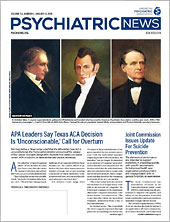I was raised in a mixture of Buddhist and Vietnamese traditions, which celebrate reincarnation as a fact of life and afterlife. Logical contortions aside, reincarnation holds a special appeal as it opens up the possibility of living the life unlived, to be in another skin for another life in another time. The idea was alluring but, ultimately, I never found conviction through spiritual practice that reincarnation was a truth.
Fast forward many years later. As a psychiatry resident at the University of California, San Francisco (UCSF), I sat before a patient in the large main room of the psychiatry inpatient unit at San Francisco General Hospital. The late afternoon sun shone down on the young man’s bespectacled face and lit up the entire room behind him—in my peripheral vision I could see the silhouettes of 20-something patients milling about, chatting with each other and with my psychiatry co-residents. My patient, a South American man who had recently immigrated to the United States, had shared with me that he was struggling with coming out as gay to his family. We were sharing a quiet moment, the ebb that sometimes comes just after a flow of words and emotion. That moment lasted only a few seconds, but still seared in my memory was my wholehearted realization that being a psychiatrist allowed me to fulfill the dream I had long since let go of: “Reincarnation is possible, but not in the way you thought. This is the closest one can ever get to reincarnation. This is it—to see the world through another’s eyes in this lifetime, not the lifetime after.”
Since then, I have tried my best to walk in my patients’ shoes, to imagine their childhoods, to hope their hopes, to grieve their losses, and to sing their joys. As a geriatric psychiatrist (about 70 percent of my patients are older than 65), each day I see about 10 to 14 patients, and every 30 to 60 minutes I experience a unique adventure with each patient. Some of these adventures are positively wild, while others are sobering. As much as I thought I knew exactly why I aspired to become a psychiatrist, what continues to motivate me are factors I could not have appreciated until I was already practicing as a psychiatrist. But because this column is titled “Why I Aspired to Be a Psychiatrist,” I’ll retrace my steps with you.
My final decision to become a psychiatrist, like some of you, occurred when I was in my third year of medical school. I made a phone call home to my mom and stepdad, who are both psychiatrists: “I’ve made my decision. I’m going to become a psychiatrist.” It was a Friday night and I had been poring over Kaplan and Sadock’s descriptions of defense mechanisms. Although this decision had been decades in the making, I hadn’t fully committed myself to psychiatry until my epiphany that night, which came to me as I turned the pages of the thick textbook: “I can imagine myself, 30 years from now, still eager to learn more about psychiatry.” Earlier in the year, though I had been excited about the prospect of becoming a geriatrician during my internal medicine rotation and a urologist during my surgery rotation, I hadn’t found myself staying in on a weekend night to read textbooks on either field. I realized then that although I could make a good geriatrician or urologist, I would be the most dedicated, and the happiest, as a psychiatrist.
My awareness of psychiatry came early in life; in middle and high school I would sometimes check in patients at my mom’s private practice. A representative situation was a Vietnamese family who brought in their 29-year-old son who had schizophrenia and had lived with untreated psychosis for nearly a decade before the family could no longer manage caring for him on their own. Over the period of months under my mom’s care, the disheveled young man who needed assistance signing forms was transformed into a polite, well-kempt gentleman who checked in with a warm smile. His family also benefited: calm and cheer replaced anxiety and sadness. I knew then that being a psychiatrist meant helping entire families, and therefore communities, in addition to helping individuals.
While I was in high school, my mom married, and my stepdad is also a psychiatrist. While my mom was a community psychiatrist with an incredibly busy private practice caring for the underserved community in the San Jose area, my stepdad was an academic psychiatrist at UCSF, caring for the underserved at San Francisco General Hospital. My mom had several Vietnamese-language radio talk shows that aired internationally, teaching laypeople about mental health. My stepdad mentored hundreds of psychiatry residents and dedicated countless hours to APA. Between the two of them, I was exposed to a wide range of what the life of a psychiatrist could mean, and it was evident that the opportunities would be limited only by my own imagination.
That is true more than ever today. It is a very exciting time to be a psychiatrist. I practice at the Palo Alto Medical Foundation, serving patients in the Bay Area in a practice that prides itself on outstanding and cutting-edge patient care and that challenges itself to improve continuously. Living in the heart of Silicon Valley, we are excited by the potential for technology to have a positive impact on our patients, while also being aware that technology has just as much potential to isolate, confuse, and distress people, too. Some of my colleagues have revisited long-dormant yet promising research centered around psychedelic therapies for traditionally treatment-refractory conditions. Policywise, we have phenomenal leaders at APA who advocate for psychiatry and our patients. As an early career psychiatrist just several years out of training, I am astonished by the lives I’ve gotten the chance to live through my patients, and I look forward to the many exciting years ahead. ■

